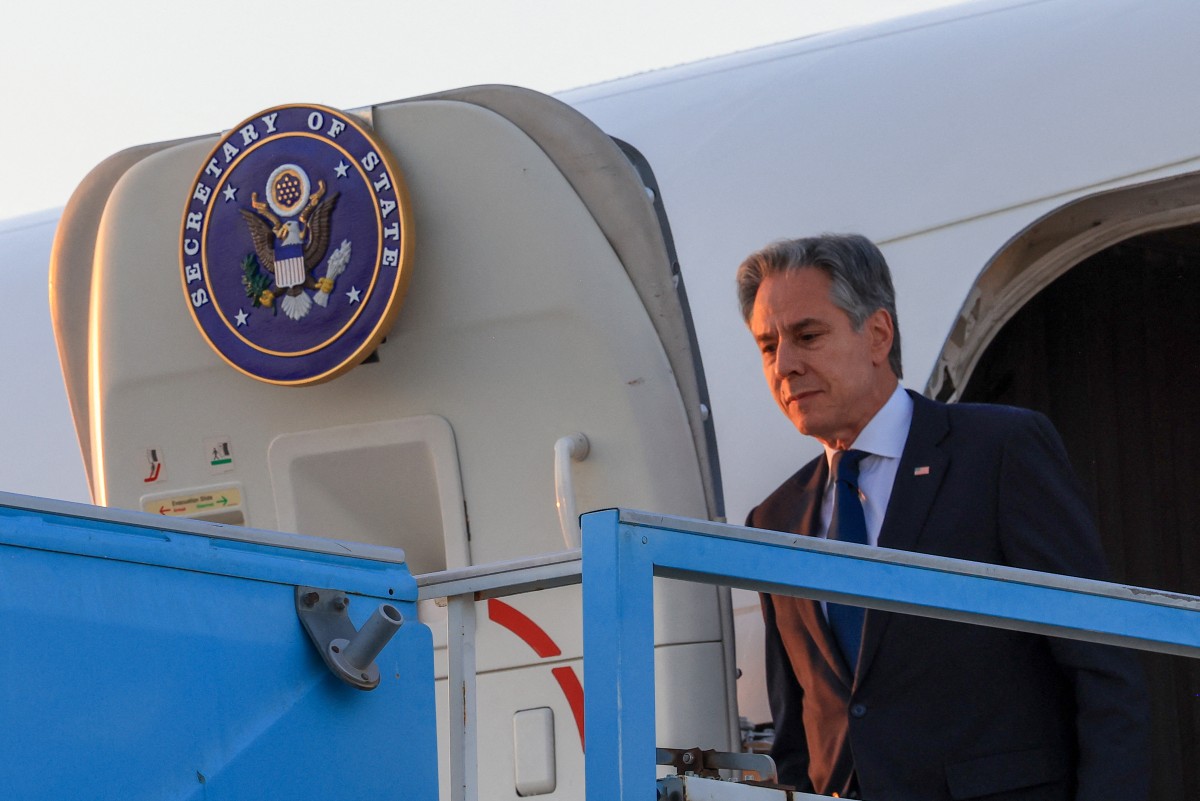Tel Aviv, Israel – Israel’s prime minister, under pressure at home and from abroad to reach a ceasefire deal with Hamas, on Sunday accused the fighters of obstinance in Gaza truce talks as top US diplomat Antony Blinken landed in Israel.
Making his ninth trip to the Middle East since the Gaza war began when Hamas attacked Israel in October, the US secretary of state is to meet Netanyahu and other Israeli leaders in a renewed bid to seal a deal that could help avert a wider conflagration.
Blinken is later set to travel on Tuesday to Cairo, where ceasefire talks will resume in the coming days.
Prime Minister Benjamin Netanyahu on Sunday reiterated that it is Palestinian group Hamas that must be pressured.
“Hamas, up to this moment, remains obstinate. It did not even send a representative to the talks in Doha. Therefore, the pressure should be directed at Hamas and (Yahya) Sinwar, not at the Israeli government,” Netanyahu said at a cabinet meeting, referring to the Hamas chief.
Western ally Jordan, hostage supporters protesting in Israel, and Hamas itself have called for pressure on Netanyahu in order that an agreement be reached.
Far-right members crucial to his governing coalition oppose any truce.
Ahead of Blinken’s visit, the foreign ministers of Britain and France were on Friday also in Israel to stress the urgency of a Gaza deal.
In late May, US President Joe Biden laid out a framework which he said was proposed by Israel. The UN Security Council later endorsed the proposal, which would freeze fighting for an initial six weeks as Israeli hostages are exchanged for Palestinian prisoners in Israeli jails and humanitarian aid enters the besieged Gaza Strip.
Ahead of the truce talks in Doha last Thursday and Friday, Hamas called on mediators to implement the Biden framework rather than holding more negotiations.
Hamas also announced its opposition to what it called “new conditions” from Israel.
On Saturday, Netanyahu’s office in a statement said Israeli negotiators have expressed “cautious optimism” about reaching a Gaza truce deal.
US, Qatari and Egyptian mediators have also reported progress and a US official said remaining gaps were “bridgeable”.
But after Biden said “we are closer than we have ever been” to a deal, Hamas political bureau member Sami Abu Zuhri dismissed as “an illusion” such optimistic talk.
Previous announcements that a deal was close during the months of on-off truce negotiations proved unfounded.
But the stakes have risen since the late July killings in quick succession of Iran-backed leaders, including Hamas political chief Ismail Haniyeh, and as the humanitarian crisis in Gaza, deepened with a feared polio outbreak.
Israeli evacuation orders have “reduced the safe zone” in the south of the territory, leaving “no more space” for displaced Palestinians, said Samah Dib, 32.
Some people “are sleeping on the street” while clean water is scarce and “there’s food at the markets, but it’s very expensive and we have no money left”, said Dib, who like almost all Gazans is among the displaced.
As efforts towards a long-sought truce continued, so has the violence in Gaza but also in the Israeli-occupied West Bank and in Lebanon, where Israeli forces and Hamas’s Iran-backed ally Hezbollah have traded near-daily fire throughout the war. They did so again on Sunday.
The rumble of tanks
Civil defence rescuers in Hamas-run Gaza reported seven killed in Israeli bombardment of Deir el-Balah and four others in air strikes on the northern Jabalia refugee camp.
The latest killings helped push the Gaza health ministry’s war death toll to 40,099.
The Israeli military said troops continued operations in central and southern Gaza and “eliminated” fighters in Rafah, on the territory’s border with Egypt.
From the Israeli-designated safe zone in southern Gaza’s Al-Mawasi, Lina Saleha, 44, said she could hear “constant artillery shelling” and the rumble of tanks “getting closer.”
“That’s not a good sign and we’re terrified and afraid,” she said.
In the West Bank, Israel said late Saturday it had killed “two senior Hamas officials” in Jenin. Hamas’s armed wing confirmed the deaths of two fighters.
In Lebanon, the UN said three peacekeepers were lightly injured in a blast in the country’s south.
Calls for ‘pressure’
Iran and its regional allies have vowed retaliation for Haniyeh’s death in Tehran — which Israel has not claimed responsibility for — and for an Israeli strike in Beirut that killed a top Hezbollah commander.
In Israel, Blinken will seek to “conclude the agreement for a ceasefire and release of hostages and detainees”, the State Department said.
Out of 251 hostages seized during Hamas’s attack, 111 are still held in Gaza including 39 the military says are dead. More than 100 were freed during a one-week truce in November.
The Palestinian Prisoners’ Club watchdog said that since the Gaza war began, Israeli forces have detained “more than 10,000 Palestinians” in the West Bank and annexed east Jerusalem, which Israel seized in 1967.
At a rally in the Israeli city of Haifa on Saturday, Guri Lotto, 51, said he was protesting to “put pressure on the government” to secure a hostage release deal and end the war.
A US official travelling with Blinken said on condition of anonymity that “the feeling is… that various sticking points that existed before are bridgeable, and that work’s going to continue”.








